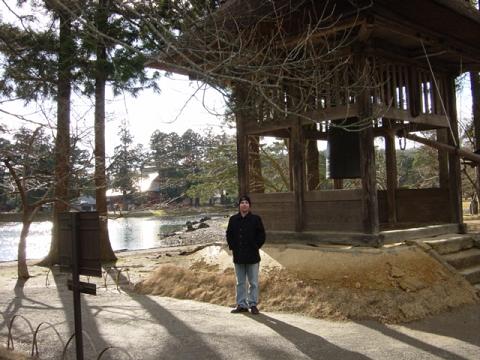I answered a lot of questions from a lot of people about the whole 'teaching in japan' thing. Teaching in Japan was certainly not for me, not my cup of tea by a long shot, but your mileage may vary. I did it shortly, but it was just to get my foot in the door in Japan.
I'll probably make some more posts on it later, but I figured it would be a good idea to collect all the questions and information and put it here. The questions are about teaching in Asia in general, but mostly about Japan.
Are you required to have any of the ESL certificates? (English as a 2nd language teaching certificates, etc.)
If you're looking at it as a career, then going for TEFL or whatever is a good idea. My university offered one of those courses but it woulda added another 1.5 years of school onto the 4 I'd already done, so I said forget it. (yeah, the one i thought about at least comes after you have a bachelor's degree). ESL certs are worthless for the general english teaching jobs. Occasionally you see an ad that requires a cert, or prefers one, but the general jobs dont require one, and there's plenty of jobs to be had.
Which country is best?
You should pick the country you're interested in. If you're not interested in any, then pick the one where you can save money (korea is better than tokyo for that because the pay is close but korea is quite a bit cheaper than japan).
Is it hard to move back home?
Some people end up staying, sure I met a guy that had been a NOVA drone for 7 years, never picked up japanese, etc., but that year he was making about $40k/year working only 3 days a week. That's not too bad, but if you're not thinking about staying your life in asia, it can feel like a prison, especially if you don't return home soon.
Where's the good money at?
The real money is to be made in private teaching. At a regular company like Nova, you make about $2k usd a month. Public schools pay a little less. It works out to about $15/hour. However, if you teach privately, the going rate is around $40/hr. And if you can, on your own, get with a company that places teachers for corporations (I taught for the Komatsu construction machine company), that works out to about $60/hr ($80-90 for a 1.5 hour lesson).
Can I get hired while living outside Japan?
I applied for jobs in person and online in the states. I ended up getting a job in the states, and moved to japan a few months before the job started. During that time, I had a few meetings with the company that employed me, and we didn't see eye-to-eye at all, so I left before I'd started the job. There I was on a 90-day passport visit, already 3 weeks in (i.e. 60 days or so to find a job in a foreign country or return home on an expensive plane ticket). It was easy to just pick up the paper (Japan Times) and look on the net each day and send resumes. I had about 10 interviews and ended up with 4 offers. So, the answer is yes, but they might not want you signing a contract until you arrive, meaning you might not actually have the job til you get there.
Do you need a university degree to teach?
Technically and legally, yes. However, I have a friend from canada that worked in japan for 4 years without any college degree. Japanese immigration only requires a high school diploma to offer a visa (this is a point of contention, but my friend did it, so anyway). And there are companies that place you into public schools as an ALT (assistant language teacher), basically covering up the fact that you don't have a degree. Of course you should have a degree to be teaching at a public school so this is definite grey area. Credentials are checked by many companies. 2 companies asked for my actual university diploma as well as an official copy of the transcripts (unopened and sent from the university, etc). Many companies look for people with NO EXPERIENCE. They think experienced people are jaded, less energetic and enthusiastic, and maybe filled with preconceptions and ideas about what teaching should be like. So boasting or overfilling your resume and such might be counterproductive.
What's the pay like in Japan?
Here's a _rough_ breakdown of the pay (i'm sticking with yen which you can basically convert by dropping 2 zero's and subtracting a few hundred dollars). i.e. 250,000yen to $2,500 to $2200. (The actual rate today is $2131, but it basically changes quite a bit everyday). Working for almost any "eikaiwa" (english conversation school)- Nova, ECC, Geos, Aeon, etc. is going to be 250,000yen a month. Working for public schools (mostly elementary school, some junior high schools, some high schools) is going to be 170,000 to 250,000 a month. Working a job that requires a certificate: 250,000 to 290,000. There isn't much difference, and there are other pluses and minuses to figure in (NOVA requires you first move in with a roommate, AEON requires many working days that go until 9pm, public schools involve mostly teaching giant classes of kids, planning lessons, helping the japanese teacher who's always in your class, etc.etc.). As for pay, South Korea is generally #1. The salary is generally the same or a little lower than Japan ($2200/month), but housing in South Korea is usually provided whereas you generally. have to pay (usually about $400/month) for rent in Japan. Next is Hong Kong and Taiwan (about $1800/month, not sure whether apartment is provided but rent would be cheap anyway). China looks like only about $600-1000 a month, though I didn't look very far into it. Thailand seems to fall into this range as well. Obviously living expenses make a huge difference. And there can be a huge difference between various areas of one country. But for example, you could save $1000/month in a bank account in Korea while also having fun, but that would be more than your whole salary in Thailand.
Can a non-native English speaker do it?
You can be a non-native english speaker and teach english in japan or in other countries. Just tell them you are native (mother is from america or whatever) to be sure. There are many non-native teachers here. In fact, I often see non-native people freelancing as proofreaders and that kind of work, with absolutely horrid english.
So what after teaching?
It's possible to move out of english teaching here into another profession, but truth is, most people never do (because they don't have job skills, they don't have anything - except for english teaching experience). Truthfully, the best way to get a great job in Japan is to be hired by a big company in your native country and apply with them to get transferred to Japan. Otherwise, you're going to probably need to start by teaching english here (this can be bad depending on your personality - english teaching here is generally just being a goofy cheerful entertainer), increase your japanese language skills (a japanese office will require business level japanese, a mixed office will require good conversational skill), and find a company generous enough to sponsor your visa (mostly a big hassle for them).
What kind of people get hired at the big eikaiwa schools?
This is a really loaded question. There is a big range of types of people. However, I have found it very true (and it's obvious just from looking at other parts of Japanese culture) that they look for certain ridiculous criteria. We'll probably have people look at my list and go "thats not true! i have a short chinese friend that got a job!" but these are the real priorities. ***You don't need all of them, but the more of them you have, the better.*** Here they are (in no particular order): blond hair, young, blue eyes, tall, thin, cheerful. Just go to the japanese page for any of the companies and look at the pictures of the westerners they use to advertise the company.
What should I write or say when they ask why I want to teach in Japan?
Say nothing about anime or martial arts. I made the mistake of thinking Japanese people would understand my interest in japan if i mentioned judo. It gave them an impression of me as violent. Expressing too much of an interest in japanese language can be bad as well. Life experience? Japan seems like a neat place? I've always wanted to live in another country and experience a different way of life? I've always liked teaching and think it'd be really great to teach Japanese people English, etc. If you don't know the answer, I'd ask you to think a bit more seriously about this. You also have to think about if you have any interest in where you're going. If you don't know much about it, I mean about the place you're going, if you don't have a genuine interest, then it will surely be exciting but there's the end of the 'honeymoon period' where you realize you're just working in another place, nothing is special, easy to burn out.
What are the interviews like?
NOVA has you do a surprise demonstration lesson at the end of the interview, even if you interview in the states or wherever you live. A lot of people choke on it. The other companies generally state in advance that you'll have to do one. Some people interview with NOVA without this, but it's good to be prepared for it. AEON interview, they tell you well in advance of the date of the interview to plan out like a 40 minute lesson, give them the lesson, and demonstrate 5 minutes of it while your competition acts like your students. My NOVA interview, the lesson part was just with 1 interviewer present (some had 2 people present). I was given a middle-school-level story to "use as a lesson." So I decided to have the person listen and repeat the story after me, sentence by sentence, correct their pronunciation and rhythm, ask them if there are any words, phrases or sentences they don't understand, ask them if there are any other questions, move on to the next sentence, finish it, then ask them their feelings/thoughts/ideas on the story. there were 2 NOVA people in the group interview. 1 person doing most of the talking, 1 person doing most of the watching/writing. impressing the 2nd person is key. i watched him scribble notes every time someone broke a silence or made a joke. i basically learned from when he was writing about what they were looking for and keyed off that to make my comments (the jokes got me the job i think).






















